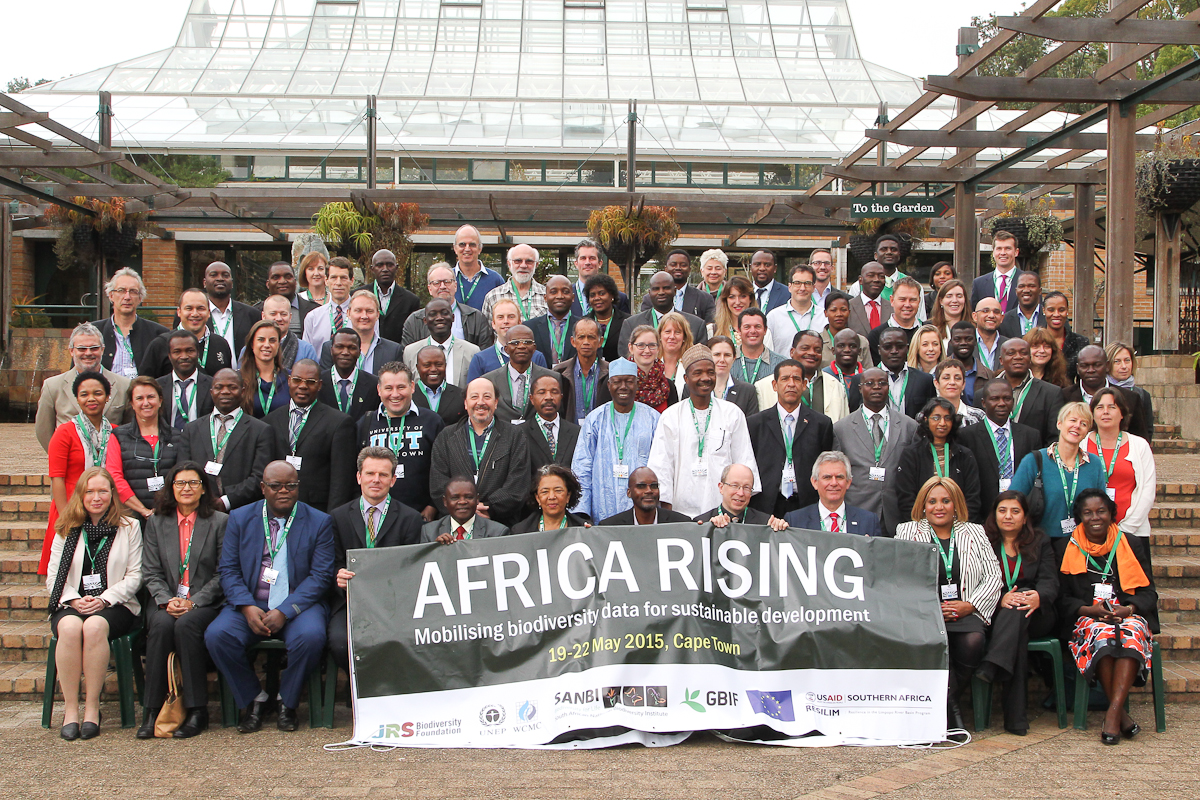 Declaration on biodiversity information for sustainable development in Africa
Declaration on biodiversity information for sustainable development in Africa
Anne-Julie Rochette, a member of CEBioS, participated to the Conference "Africa Rising: Mobilising Biodiversity Data for Sustainable Development". The conference took place at Kirstenbosch National Botanical Garden, Cape Town, South Africa, from 19 to 22 May 2015.
Approximately 100 delegates attended this exclusive invitation-only meeting, representing over 20 African governments as well as various UN agencies, international organizations and research institutions.

(Picture credit: Gavin Withers Photography)
| Concerned URL | http://www.gbif.org/event/78473 |
|---|---|
| Source | SANBI-GBIF |
| Release date | 27/05/2015 |
| Contributor | Anne-Julie Rochette |
| Geographical coverage | Africa, |
| Keywords | Biodiversity data, Sustainable development, Africa, |
The objectives of the conference:
- Increase regional understanding of the biodiversity data-science-policy value chain and identify the opportunities and solutions that it presents for sustainable development in Africa;
- Draw attention to relevant tools, resources and learning networks for building effective biodiversity information systems in Africa; and
- Articulate a ‘Plan of Action’ for mobilising and mainstreaming Africa’s policy-relevant biodiversity data, and forge collaborative partnerships to implement it.
The event culminated with the release of a ‘Declaration on biodiversity information for sustainable development in Africa’, a joint statement of intent developed by participants during the conference. The declaration’s release on International Day for Biological Diversity (IDB) (22 May 2015) carries added poignancy given that the theme for IDB 2015 is ‘Biodiversity and Sustainable Development’.
=====
Text of the Declaration:
"Declaration on biodiversity information for sustainable development in Africa
On this International Day for Biological Diversity in 2015, we the participants of the conference, Africa Rising: Mobilising Biodiversity Data for Sustainable Development, held in Cape Town, South Africa, from 19 to 22 May 2015, agree that the quality of decision-making relies on the quality of information considered and hereby declare our vision for 2030 as a world in which biodiversity information contributes fully to sustainable development in Africa. Specifically, we desire that:
- Governments subscribe to the principle of free and open access to biodiversity information;
- Policymakers are adequately informed to respond effectively to global environmental change;
- Countries are sufficiently capacitated to measure and track the status and trends of biodiversity and ecosystem services;
- Biodiversity considerations are mainstreamed into all planning decisions; and
- All sectors of society can contribute towards and benefit from a global pool of biodiversity knowledge derived from Earth observations.
Biodiversity is the bedrock of sustainable development. In Africa, biodiversity makes a profound contribution to human wellbeing and security, underpinning vital sectors including agriculture, fisheries, forestry, water, public health, tourism and energy. Next to our people, biodiversity is our greatest asset. If managed wisely, it could bring about a surge in green economic opportunities, strengthening the resilience of livelihoods, and catalysing sustainable development across the continent.
Data is the currency of the information age. The global data revolution presents new opportunities for evidence-based decision-making, active citizenship, technology transfer, education and research.
Critical data-deficits impair decision-making. Achieving sustainable development in Africa will require relevant reliable biodiversity information as well as tailored products and services to be made available to researchers, natural resource managers and policymakers in consumable forms.
Regional cooperation can spur coordinated action. By working together we can pool resources, share expertise, enhance capacity and efficiently progress towards the following goals:
- Evidence-based decision-making supported by coordinated science-policy dialogue within and outside the biodiversity sector;
- Capacity building across the information value chain to empower stakeholders to produce and make accessible accurate biodiversity data for sustainable development;
- Mobilize and make openly accessible relevant biodiversity data to support education, research and decision-making for sustainable development;
- Leverage sustained funding.
Africa could lead the world in biodiversity information management. Our continent is bursting with human ingenuity and brimming with natural resource wealth. Let us unlock the potential of biodiversity information to help secure a sustainable future for all. It is our responsibility."
Please note that this information has expired.
 This site uses cookies in order to function as expected. By continuing, you are agreeing to our
This site uses cookies in order to function as expected. By continuing, you are agreeing to our 




